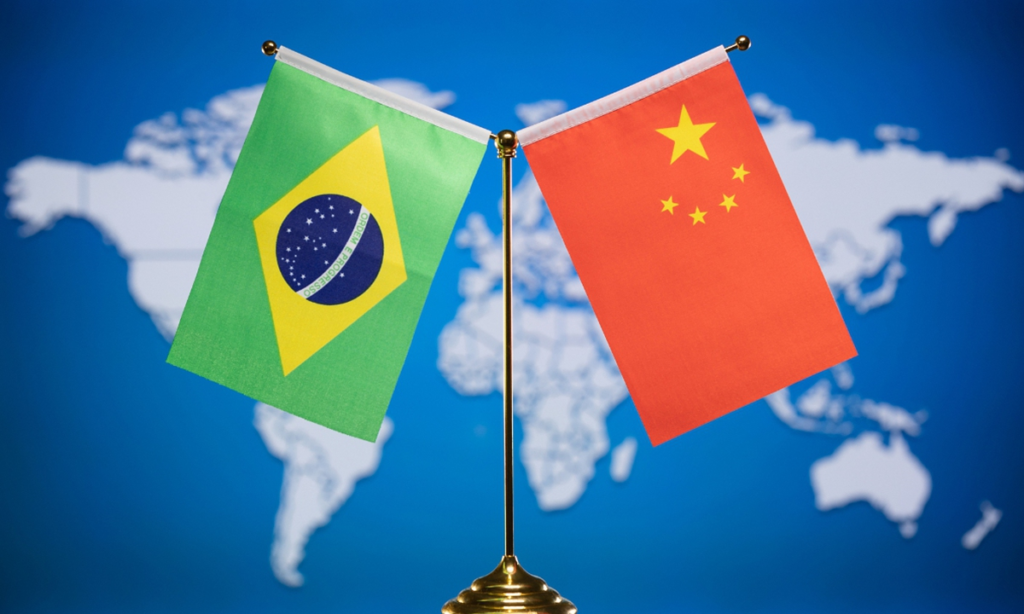The trade relationship between China and Brazil has been flourishing, leading to a significant volume of goods being shipped between the two countries. Understanding the various transportation methods, associated costs, transit times, and other logistical aspects is crucial for businesses engaged in this international trade. This article will provide an in – depth analysis of the main transportation options from China to Brazil.

Sea Freight From China to Brazil
Shipping Ports in China and Brazil
In China, some of the major ports for shipping to Brazil include Shanghai Port. It is one of the busiest ports in the world, with advanced infrastructure and facilities capable of handling a large number of containers and various types of cargo. Its strategic location and excellent connections to inland transportation make it a prime choice for exporters. Shenzhen Port is also significant, especially for goods from the southern manufacturing hubs. It has specialized terminals for different cargo types, facilitating efficient loading and unloading. Ningbo – Zhoushan Port, with its vast capacity and modern facilities, is another important port for shipments to Brazil.
In Brazil, the Port of Santos is a key destination. It is the busiest port in Latin America and handles a wide range of cargo, including containers, bulk commodities, and liquid cargo. The Port of Rio de Janeiro is also important, especially for its role in handling various types of imports and having connections to the country’s major industrial and commercial centers. These ports in both countries form the backbone of the sea freight route between China and Brazil.

COST OF SHIPPING 20FT & 40FT CONTAINER FROM CHINA TO Brazil
The cost of shipping a 20 – foot container from China to Brazil can vary significantly. On average, it can range from $2,500 to $5,000. For a 40 – foot container, the cost usually falls between $4,000 and $8,000. These costs are influenced by several factors. The origin port in China and the destination port in Brazil play a role. For instance, if the shipping route involves more complex navigation or longer distances within Brazil’s coastal area, it may increase the cost. The type of goods being shipped also matters. Hazardous or specialized cargo may require additional handling and safety measures, driving up the price. Seasonal fluctuations in demand and supply of containers can also impact the rates.
Shipping Container FCL Costs from China to Brazil
Full Container Load (FCL) shipping offers several advantages. When shipping FCL, the shipper has exclusive use of the container, reducing the risk of damage from other shippers’ goods. The cost per unit of cargo may be lower for large shipments. The FCL cost depends on the container size, as mentioned above, but also on the shipping line chosen. Different shipping lines may have different pricing strategies based on their service quality, vessel speed, and other factors. Additionally, any special requirements such as refrigeration for perishable goods will add to the FCL cost.
| Departure Port | Destination Port | Container 20’ (USD) | Container 40’ (USD) | Estimated Transit Time (days) |
|---|---|---|---|---|
| Shanghai | Santos | 3215 | 4415 | 35 |
| Shanghai | Navegantes | 3215 | 4415 | 40 |
| Shanghai | Paranagua | 3215 | 4415 | 40 |
| Shenzhen | Santos | 3100 | 4300 | 35 |
| Shenzhen | Navegantes | 3100 | 4300 | 40 |
| Shenzhen | Paranagua | 3100 | 4300 | 40 |
| Ningbo | Santos | 3800 | 5000 | 35 |
| Ningbo | Navegantes | 3800 | 5000 | 40 |
| Ningbo | Paranagua | 3800 | 5000 | 40 |
LCL Sea Freight from China to Brazil
Less – than – Container – Load (LCL) sea freight is suitable for smaller shipments. In LCL, multiple shippers’ goods are consolidated into a single container. While this option is cost – effective for small – volume shipments, there are some considerations. The cost per unit of cargo may be higher compared to FCL when shipping large quantities over time. There is also an increased risk of damage or delay during the consolidation and de – consolidation process at the container freight stations. The LCL cost is calculated based on the volume or weight of the goods, whichever is higher, and also includes handling and consolidation charges.
| Departure Port | Destination Port | USD/CBM (1-3 CBM) | USD/CBM (3-9 CBM) | Estimated Transit Time (days) |
|---|---|---|---|---|
| Ningbo | Santos | 200 | 180 | 32 |
| Ningbo | Navegantes | 200 | 170 | 43 |
| Ningbo | Paranagua | 200 | 170 | 44 |
| Shanghai | Santos | 220 | 200 | 35 |
| Shanghai | Navegantes | 220 | 200 | 43 |
| Shanghai | Paranagua | 220 | 200 | 44 |
| Shenzhen | Santos | 210 | 185 | 37 |
| Shenzhen | Rio Grande | 210 | 185 | 36 |
| Shenzhen | Paranagua | 210 | 185 | 30 |
How long does it take to ship from China to Brazil?
Maybe you’re wondering how long it will take to transport goods from China to Brazil by sea or air. Of course, shipping times will vary significantly between air freight and sea freight. The general air transportation time is 5 to 12 days, and import and export customs clearance and domestic land transportation can be achieved.
Of course, shipping via ocean carriers takes much longer, with ocean shipping times from China to Brazil expected to be 30 to 60 days.
If transit time is an issue and air freight is not a viable option for your shipment, FCL is usually the fastest form of ocean freight. However, if you do not have enough goods to fill the container and therefore opt for LCL shipping, you need to take into account the slightly longer shipping time involved.
| Port to Port (days) | Door to Door (days) | |
|---|---|---|
| Sea Freight FCL | 35-40 | 49-54 |
| Sea Freight LCL | 35-44 | 52-55 |
| Air freight | 7-10 | 12-19 |
Sea Freight From China to Brazil time
The transit time for sea freight from China to Brazil typically ranges from 30 to 45 days. This duration can be affected by various elements. The shipping route chosen by the carrier is a significant factor. Some routes may make more stops along the way for loading or unloading at other ports, which can extend the journey. Weather conditions in the Pacific Ocean, the South Atlantic Ocean, and around the Cape of Good Hope (if the route passes there) can also cause delays. Adverse weather, such as storms or strong currents, may force the vessel to slow down or change course. Additionally, port congestion at either the origin or destination ports can lead to longer waiting times for the vessel to berth and unload.
- Shanghai to Santos or Paranagua – 36 days FCL and LCL
- Shanghai or Ningbo to Salvador – 36 days FCL
- Dalian to Santos – 36 days FCL, 48 days LCL
- Xiamen to Santos – 36 days FCL, 42 days LCL
- Shenzhen to Santos – 28 days FCL, 35 days LCL
- Ningbo to Santos – 36 days FCL, 37 days LCL
- Guangzhou to Santos – 39 days LCL
- Shantou to Paranagua – 40 days LCL
- Shenzhen to Paranagua – 36 days LCL
- Changsha to Santos – 36 days FCL
- Huangpu to Rio de Janeiro – 30 days FCL
- Ningbo to Itapoa or Salvador – 36 days FCL
- Ningbo to Itajai – 46 days FCL
- Ningbo to Paranagua – 34 days FCL
- Shanghai to Navegantes – 36 days FCL
- Qingdao to Santos – 39 days FCL, 42 days LCL
- Xiamen to Vitoria – 36 days LCL
- Zhongshan to Santos – 32 days FCL
Air Freight From China to Brazil
Major Airports in China and Brazil
In China, some of the major airports for air freight to Brazil include Shanghai Pudong International Airport. It has extensive cargo handling facilities, including specialized terminals for different types of goods. It is well – connected to the domestic transportation network, facilitating the collection of goods from various manufacturing regions. Guangzhou Baiyun International Airport is also significant, especially for goods from southern China. It has a large volume of international cargo traffic and offers a wide range of services for air freight.
In Brazil, São Paulo – Guarulhos International Airport is a key airport for receiving international air freight. It has modern cargo facilities and connections to the country’s major economic centers. Rio de Janeiro – Galeão International Airport also plays an important role in handling air cargo, with its location providing access to the southeastern region of Brazil.
Air Freight Rates from China to Brazil
Air freight rates from China to Brazil are generally higher than sea freight. The cost per kilogram can range from $5 to $15. The rate depends on the type of goods, with high – value or specialized goods usually attracting higher prices. The weight and volume of the shipment also play a role. Airlines calculate the chargeable weight based on either the actual weight or the volumetric weight (calculated by multiplying the length, width, and height of the package and dividing by a specific factor). Additionally, the airline carrier, the specific route flown, and any additional services required, such as expedited handling or temperature – controlled storage, can impact the air freight rate.
| Departure City | Range | Destination Airport | Price Per KG ($USD) | Estimated Transit Time (days) |
|---|---|---|---|---|
| Shanghai | Rate for 100KGS-299KGS | Guarulhos (GRU) | 7.3-10.5 | 7-8 |
| Shanghai | Rate for 100KGS-299KGS | Sao Paulo (VCP) | 7.8-10.5 | 10 |
| Shanghai | Rate for 300KGS-1000KGS | Guarulhos (GRU) | 7.3-10.5 | 7-8 |
| Shanghai | Rate for 300KGS-1000KGS | Sao Paulo (VCP) | 7.8-10.5 | 10 |
| Shanghai | Rate for 1000KGS+ | Guarulhos (GRU) | 7.3-10.5 | 7-8 |
| Shanghai | Rate for 1000KGS+ | Sao Paulo (VCP) | 7.8-10.5 | 10 |
| Guangzhou | Rate for 100KGS-299KGS | Guarulhos (GRU) | 7.9-10.5 | 10 |
| Guangzhou | Rate for 300KGS-1000KGS | Guarulhos (GRU) | 7.4-10.5 | 10 |
| Guangzhou | Rate for 1000KGS+ | Guarulhos (GRU) | 7.4-10.5 | 10 |
Air Freight From China to Brazil time
The transit time for air freight from China to Brazil is relatively short, usually between 2 to 5 days. Direct flights will obviously be quicker, but even with layovers or connections, air freight offers a significant time advantage over sea freight. However, it’s important to note that the shorter transit time comes at a higher cost, and businesses need to balance the cost and time considerations based on the nature of their goods and delivery requirements.
- Guangzhou to Sao Paulo – 9 days
- Guangzhou to Viracopos or Rio De Janeiro – 8 days
- Zhengzhou to Sao Paulo – 12 days
- Beijing to Sao Paulo – 11 days
- Shanghai to Rio de Janeiro – 11 days
- Shanghai to Salvador – 5 days
- Shanghai to Sao Paulo – 7 days
- Shanghai to Viracopos – 9 days
- Shenzhen to Belo Horizonte – 8 days
- Shenzhen to Curitiba – 9 days
- Shenzhen to Sao Paulo – 10 days
DDP Shipping Cost From China To Brazil
DDP (Delivered Duty Paid) shipping cost includes not only the transportation cost but also all duties, taxes, and other fees associated with getting the goods to the destination in Brazil. This provides the importer with a more comprehensive cost estimate upfront. The DDP cost can be significantly higher than just the basic shipping cost, especially for goods subject to high import duties in Brazil. It depends on the type of goods, their value, and the specific trade agreements (if any) between China and Brazil. Freight forwarders often play a crucial role in calculating and managing DDP shipments to ensure that all costs are accurately accounted for.
| From | To | Transit time | LCL cost | |
| Sea Freight DDP | China | Brazil | 35 to 45 days | $7.33/kg for 45kg+ shipments to an average low of $3.60/kg for 1000kg+ shipments. |
| Air Freight DDP | China | Brazil | 3 to 8days | $9.33/kg for 45kg+ shipments to an average low of $6.5 /kg for 1000kg+ shipments. |
Freight Forwarder from China to Brazil
Freight forwarders are essential in the shipping process from China to Brazil. They have in – depth knowledge of the shipping industry, including the best shipping lines, airlines, and routes. They can handle various tasks such as booking cargo space, arranging for transportation to the port or airport, preparing documentation, and coordinating with customs authorities in both countries. Freight forwarders can also provide valuable advice on cost – saving measures, packaging requirements, and any special regulations that may apply to the shipment. They act as an intermediary between the shipper and the carrier, ensuring a smooth and efficient shipping process.
Customs Clearance from China to Brazil
Customs clearance is a critical part of the shipping process. In China, exporters need to ensure that all goods are properly declared and accompanied by the necessary documentation, such as commercial invoices, packing lists, and certificates of origin. The Chinese customs authorities will verify the information and may conduct inspections if necessary. In Brazil, the customs process is more complex. Imported goods are subject to various duties, taxes, and regulatory requirements. The customs authorities will check the documentation, including the bill of lading (for sea freight) or airway bill (for air freight), to ensure that the goods comply with Brazilian import regulations. They may also conduct physical inspections of the cargo to verify its contents, value, and origin. Goods that do not meet the requirements may be subject to fines, delays, or even seizure.
Product Information Imported from China to Brazil
When shipping goods from China to Brazil, detailed product information is crucial. This includes the description of the goods, their classification under the Harmonized System (HS) codes, which determine the applicable import duties and taxes. The quality and specifications of the goods should also be clearly stated. For example, if it’s electronic equipment, details such as the model, power requirements, and safety certifications should be provided. This information is used by customs authorities in Brazil to assess the goods and by the importer to ensure that the products meet their requirements. Additionally, any intellectual property – related information, such as trademarks or patents, should be properly documented to avoid any legal issues during the import process.
- Motors: From generators to batteries and more.
- Machinery: including engines and refrigeration equipment.
- Vehicles: including cars, trucks and related parts.
- Computers and Electronics: Personal computers, parts and other electronic equipment.
- Fossil fuels: such as oil and coal.
- Plastics and plastic products: from plastic packaging to PVC.
- Optics, Technology, Medical Devices: Covers eyewear, technology and medical devices.
- Steel: Steel raw materials and processed products.
- Electrical Appliances: Various household and commercial appliances.
- Organic chemicals: used in various industries.
- Aluminum: Raw and processed aluminum products.
- Tires: Various types and sizes for different vehicles.
Conclusion
Shipping from China to Brazil involves a multitude of factors, from choosing the right transportation method based on cost and time considerations to ensuring proper customs clearance and providing accurate product information. By understanding these aspects in detail, businesses can optimize their shipping operations, reduce costs, and ensure a seamless import process in Brazil, thereby strengthening the trade relationship between the two countries.


